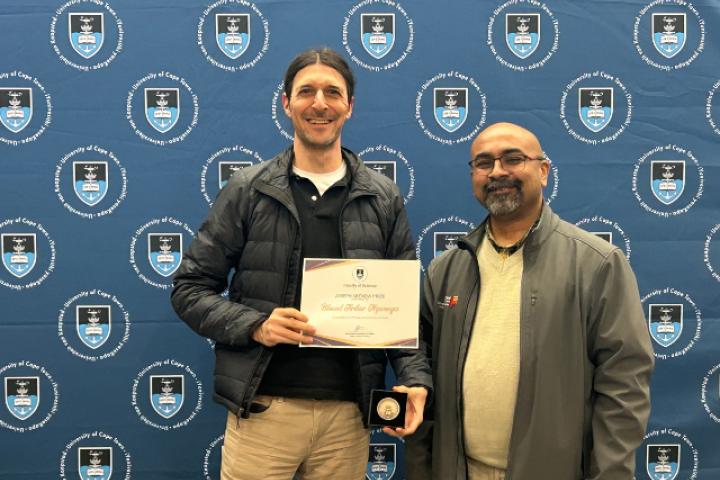Celebrating the brightest minds in science for the 2024 academic year

During the Science Student Awards ceremony on Monday, 28 May 2025, nearly 110 students were awarded over 160 class and departmental awards for the 2024 academic year.
The Dean of Science, Professor Hussein Suleman, welcomed guests and students, expressing pride in the faculty’s achievements.
Notable students receiving multiple awards include Andreia De Sousa, who received the Chemistry Prize for the best second-year chemistry student progressing to third year in the department, along with class awards in molecular and cell biology and statistics.
Reflecting on her achievements, De Sousa shared, “It feels incredible to have my efforts and achievements recognised by the faculty. In a field saturated with talented and passionate individuals, it can be difficult to stand out or make a name for yourself, and so I never expected to have my achievements highlighted this way that they have been. I am both extremely grateful and overwhelmed.”
Justin Powell continued his streak of excellence at the postgraduate level, claiming the Gordon Percy Memorial Award for best chemistry honours student, the Alistar Stephen Memorial Award for his outstanding honours project, and the Best Poster Award for his research presentation.
Powell credits his work ethic and hopes to inspire future scientists, saying, “My mother always told me: ‘The difference between potential and reality is work’. While I don’t work hard for recognition, being acknowledged as a top achiever in the chemistry department truly makes the hours feel worth it. I hope to inspire the next generation of chemists and scientists.”
Associate Professor Will Horowitz accepted the Joseph Arenow Prize and the PhD Medal awarded for the faculty’s best PhD thesis on behalf of Blessed Arthur Ngwenya, who was unable to attend the event.
Ngwenya’s PhD thesis titled The Casimir Effect in Non-Abelian Gauge Theories on the Lattice is a study within the field of quantum chromodynamics. It explains the measured change in the zero-point energy of a quantum vacuum due to fluctuations in vacuum fields when physical objects of different geometries are placed in the vacuum of three- and four-dimensional non-abelian gauge theories with varying degrees of freedom. He conducts numerical studies of the zero-point energy shifts through the measured Casimir potential on the geometries of static parallel wires and plates, as well as the non-trivial geometries of symmetrical and asymmetrical tubes and boxes. He demonstrates that the pressure is negative for all the geometries considered and that the pressure for the symmetrical tube is contrary to the abelian non-interacting scalar field theory, which measures a positive pressure. He proposes various techniques to model the energy requirements for creating the different geometries in a quantum vacuum. He shows that increasing the temperature from a confined to a deconfined phase does not alter the measured pressure.
On receiving the faculty’s highest honour, Ngwenya expressed, “It’s a deep honour to receive the PhD Medal and the Joseph Arenow Prize. This recognition is a tribute not only to years of rigorous research but also to the support of my mentors, peers, and community who helped shape this journey. I hope this serves as encouragement to young scientists, especially from underprivileged backgrounds, that they too can contribute meaningfully to the frontier of knowledge.”
As the event concluded, a sense of accomplishment and inspiration filled the room. View photos from the event by visiting the online photo album.
